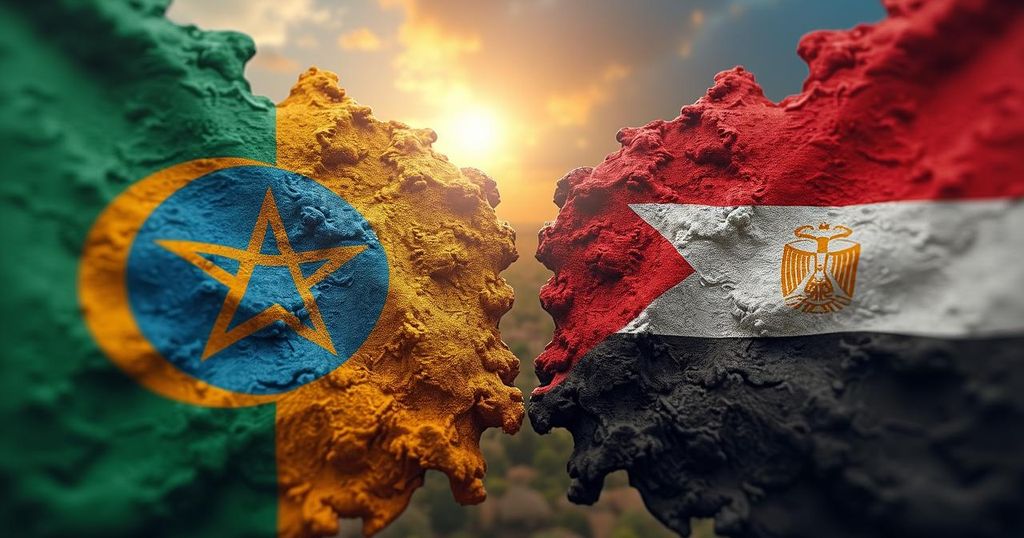Eritrea, Egypt, and Somalia Forge Alliance Against Ethiopia

Leaders from Eritrea, Egypt, and Somalia met in Asmara to strengthen ties against Ethiopia, amid rising tensions and territorial disputes. Their joint declaration emphasizes regional sovereignty, highlighting ongoing diplomatic fallout. Analysts view this as a strategic alignment aimed at increasing pressure on Ethiopia, historically noted for its support of Somalia against terrorism, yet facing growing discontent from both Somalia and Eritrea due to various geopolitical disputes.
In recent developments, the leaders of Eritrea, Egypt, and Somalia convened in Asmara, the capital of Eritrea, to strengthen their collaborative stance against Ethiopia. The summit concluded with an official statement emphasizing the importance of “respect for the sovereignty… and territorial integrity of the countries in the region,” a declaration that may subtly highlight Ethiopia’s aspirations for access to a sea port. Tensions have been escalating, particularly following a diplomatic fallout that has aligned Somalia more closely with Egypt and Eritrea, both of which harbor long-running disputes with Ethiopia. Analysts, such as Hassan Khannenje, director of the Horn International Institute for Strategic Studies, characterize this growing alliance as an “axis against [Ethiopian capital] Addis Ababa,” suggesting it is an effort to unify opposition against Ethiopia’s policies. A notable image from the meeting displayed Eritrean President Isaias Afwerki shaking hands with Egyptian President Abdul Fattah al-Sisi and Somali President Hassan Sheikh Mohamud. Together, they expressed their commitment to strengthen Somali state institutions to face both internal and external challenges, particularly in combatting terrorism. This summit marked President Sisi’s inaugural visit to Asmara, whereas President Mohamud had already visited three times earlier in the year. Ethiopia has previously played a significant role in supporting Somalia’s government against al-Qaeda-affiliated group al-Shabab. However, Somalia’s discontent has been fueled by Ethiopia’s recent agreement with Somaliland, a self-declared republic that Somalia views as integral to its territory. Additionally, the relationship between Ethiopia and Egypt has deteriorated significantly over the past decade, primarily due to Ethiopia’s construction of a large hydroelectric dam on the Nile River, which Egypt perceives as a potential threat to its water supply. Recent military developments also indicate a strengthening of military ties between Egypt and Somalia, with reports of significant shipments of military equipment entering Somalia from Egypt. Historically, relations between Ethiopia and Eritrea were seen to improve following a peace declaration in 2018, for which Ethiopian Prime Minister Abiy Ahmed was awarded the Nobel Peace Prize. Yet, relations soured again after the civil conflict in Ethiopia’s Tigray region, with Eritrea having supported the Ethiopian government during that period. Tensions escalated further after Prime Minister Abiy’s announcement regarding Ethiopia’s intent to secure port access on the Red Sea.
The geopolitical dynamics of the Horn of Africa have been historically complex, characterized by shifting alliances and ongoing conflicts. Ethiopia, Egypt, and Somalia have all experienced periods of tension, particularly surrounding territorial disputes and resource management. The recent alignment of Eritrea, Egypt, and Somalia against Ethiopia reflects both historical grievances and contemporary political strategies. The backdrop features Ethiopia’s significant role in regional security, particularly in combating extremist groups, contrasting with its aspirations for maritime access, which has exacerbated regional tensions, especially with Somalia and Eritrea that have territorial concerns. The Nile River dispute further complicates the region’s diplomatic landscape, with Egypt fearing that Ethiopia’s development of hydroelectric projects could jeopardize its water resources.
In summary, the recent meeting among leaders from Eritrea, Egypt, and Somalia marks a significant development in the geopolitical landscape of the Horn of Africa, showcasing their united front against Ethiopia amid rising tensions. The statement issued reflects underlying territorial anxieties and strategic alignments that could lead to further complications in the region. Analysts suggest that this collaboration is both a response to historical conflicts and current diplomatic disputes, particularly regarding resource management and sovereignty over strategic territories.
Original Source: www.bbc.co.uk






